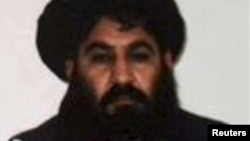The new leader of Afghanistan’s Taliban insurgency has rejected peace talks with the government unless it revokes security pacts with both the United States and NATO, and all foreign forces withdraw from the country.
In a message marking the occasion of the Muslim festival of Eid-ul-Adha, Mullah Akthar Mansoor revived the group’s demands for the total withdrawal of foreign troops.
“If the Kabul Administration wants to end the war and establish peace in the country, it is possible through ending the occupation and revoking all military and security treaties with the invaders,” he contended.
NATO's combat mission ended late last year but Kabul signed separate deals with the United States and the foreign military coalition for them to be able to continue with a training and advising military mission in Afghanistan that comprises around 14,000 troops, mostly Americans.
Mansoor warned that “foreign pressure” will not help resolve the Afghan conflict “but will rather create other problems.” He did not name any country, but neighboring Pakistan where members of the Taliban are allegedly sheltering, has in recent months stepped pressure on the insurgents to engage in peace talks with President Ashraf Ghani’s national unity government in Kabul.
In July, a Taliban delegation held the first face-to-face talks with an Afghan government delegation in 14 years, raising hopes for an Afghan reconciliation process. However, following the talks in Islamabad, it was revealed that Taliban supreme leader, Mullah Omar, had died two years ago, suspending the talks indefinitely.
The revelation embroiled the Taliban in an internal power struggle after some senior commanders and Omar's family opposed Mansoor's appointment as the new Taliban chief. That dispute, however, appears to have been resolved after Omar’s family last week pledged allegiance to Mansoor, though some opposition from other groups persists.
In his Tuesday’s message, Mansoor tried to address concerns regarding rifts within the group’s ranks, dismissing them as propaganda “stratagems” by the enemy.
“I call on those brothers-in-faith who have grievances to thwart the maligning propaganda and diabolical conspiracies of the enemy," he said.
It remains unclear how unified the Afghan Taliban is now under Mansoor’s leadership. It is also unclear how powerful rival insurgent groups, including some allied with the Islamic State, are in some parts of Afghanistan.
Since the July talks, relations between Islamabad and Kabul have also deteriorated. Afghan President Ashraf Ghani had reached out to Pakistani military and civilian officials to try to put aside their troubled history to help forge a deal to end the violence in Afghanistan.
However, the bilateral cooperation has also been halted because of rise in insurgent attacks in Afghanistan that the Afghan government has blamed on the Haqqani network of insurgents fighting alongside the Taliban with alleged links to the Pakistani spy agency, ISI, charges Islamabad denies as baseless.




